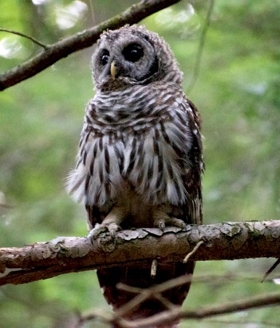Poems by Katherine Peters
Archives: by Issue | by Author Name

Florida: The Clearing Space
“The owl of Minerva spreads her wings only with the falling of dusk.” 1
by Katherine Peters
From Canary Summer 2020
After years in the subtropics, Katherine recently returned home to the Maine woods of her childhood. She lives next to Lake Arrowhead off the Little Ossipee River, where her walks under the trees yield encounters with eagle, osprey and curious deer.

A few days ago I woke up to men with machines clear-cutting the copse of trees behind my house – an incontestably wild place, despite its small surface area. To the tune of roaring chainsaws and brusque shouts they felled trees, snapped vines, ripped out aerial roots, dragged bracken free from their tangled meshworks, leaving only a bare sandpit, an upwelling of grey dust crawling with fire-ants – desert isle with a scorpion sting – ringed primly round with citrus, ficus, palm.
My favorite tree they left standing but only just. The tree, which I’ve tentatively identified as a ficus, 2 has grown up against the ten-foot wood fence separating my miniature wilderness from the neighbor’s trim lawn. The tree is made of three crooked trunks emerging from a single bole, each encircled by a tangle of snake-thick vines. At around fifteen feet the trunks branch, arching up and outward in the direction of my balcony, dividing unevenly into a welter of tapering twigs; at twenty feet each twisted arm and crooked finger come together in cumulative grace, igniting in a canopied chaos of waxy leaves, their deep green catching at the light. Spanish moss, ghost epiphyte, haunts every gap in the crown; jessamine vines trace solitary leaf lines uptrunk, then split and spread within the verdant net, complicating its shades, foliage curling delicately round foliage, erupting in butter yellow trumpet blooms in early spring.
The weave of branch, leaf, and vine extends roof-like overhead, so that when I lie back on the rough wood of my balcony I can play “I spy” with my living ceiling. It teems, even on the hottest days. Scrappy subtropical squirrels enact their endless acrobatics, their games fiercely earnest, pointless and necessary; the bloodred cardinal coyly poises in his niche (he wreaks havoc on my succulents and I let him, just to be near the feathered flicker); and, when I stay out past dusk, the barred owl, snow-pale smudge against her shadowy recess, shivers and hunches, her uncanny call piercing the dark.
But they came 'round in hard hats and neon vests, with beer-swollen bellies and sweat-satin shirts, and took saw to bark, axe to bole. The canopy is gone. My tree still stands: three long stems, white circles scarring its sides where its boughs once breached. The crown has been cut away so as not to encroach beyond its contained perimeter. The neighbor tells me it’ll grow back fast, something about the subtropical weather. He tells me it was necessary – the roof of the duplex in danger of molding from the excessive shade, seasonal power-washes being expensive. Now the sun blazes and little maintenance is needed to prevent collapse. A matter of economics, the man tells me, good for everyone living under the roof. But no one asked me. Vaulting gone, my shelter taken, I discover within, a clearing space.
The tree will grow, but its timetable and shape refuse calculation. For now the sun beats fiercely down, making my balcony unbearable at noon. And the barred owl hasn’t found her way back; she’ll have a difficult time finding a branch with suitable recess.
Still, I leave my door open at night, listening to the crickets’ alarm and the blaring silence behind it, waiting for the owl’s call. Sometimes I try to describe it, the cry, but it doesn’t feel possible. A punctuated rhythm. An unearthly stuttering surf slipping into uneven crescendo, the plaintive wave up into against groan and slur, then descent into a muffled close, etched with adenoidal edge. It leaves that unfinished feeling—triumph stitched with awe. The peripheral sound has its echo in dusk’s shape-shifting shadows, coordinates in the darkening at which we slide into night sight.
As I lie, tangled in bedsheets and tendrils of heat, staring down the empty dark, the memory of that sound roots, turns, twists inside me. Luminous, unanswered. Perhaps I will hear it again, as I heard it once: the knowledge clutching at my core, sudden and annihilating, that nothing could affect me more. And she will again keep her late watch, calling into the night.
____________________
1 “Die Eule der Minerva beginnt ihren Flug in der Abenddämmerung” –Hegel
2 Thanks to the clear-cutting, I’ve discovered the polycephalous nature of my tree: part-ficus, part-hardwood. Ficus are hemiepiphytes, beginning life in the crown of another tree in a relationship of mutualism. They are beautifully adaptive. Their “vines” are in fact aerial roots, now creepers and climbers, now supports for their host tree’s branches, now a circular sheath for its trunk, now voyagers reaching down from their great height to root themselves in permissive ground. Now developing lungs to breathe during flooding. Under certain conditions certain species can become parasitic, the vines quietly encircling and then strangling their host, the single ficus becoming an elaborate forest of uninterrupted ficus. It is unclear what kind of ficus this is or may become, whether or not it will consume its partner.
© Katherine Peters